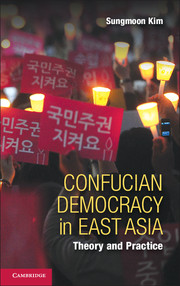Book contents
- Frontmatter
- Dedication
- Contents
- Acknowledgments
- Introduction
- Part I Beyond Thick Confucian Communitarianism and Meritocratic Elitism
- 1 Beyond Thick Confucian Communitarianism I: The Confucian Social Self and Its Discontent
- 2 Beyond Thick Confucian Communitarianism II: Toward Civil Confucianism
- 3 Against Meritocratic Elitism
- Part II Confucian Democracy in Theory – A Pluralist Reconstruction
- Part III Confucian Democracy in Practice – The Korean Case
- Bibliography
- Index
- References
2 - Beyond Thick Confucian Communitarianism II: Toward Civil Confucianism
Published online by Cambridge University Press: 05 June 2014
- Frontmatter
- Dedication
- Contents
- Acknowledgments
- Introduction
- Part I Beyond Thick Confucian Communitarianism and Meritocratic Elitism
- 1 Beyond Thick Confucian Communitarianism I: The Confucian Social Self and Its Discontent
- 2 Beyond Thick Confucian Communitarianism II: Toward Civil Confucianism
- 3 Against Meritocratic Elitism
- Part II Confucian Democracy in Theory – A Pluralist Reconstruction
- Part III Confucian Democracy in Practice – The Korean Case
- Bibliography
- Index
- References
Summary
As we have seen in the previous chapter, the Confucian communitarian critics of liberalism (and liberal democracy) argue that as an ethical theory liberalism is much too individual-centered and its staggering emphasis on individual right is fundamentally at odds with the obvious human condition that man or woman is radically situated in the particular social context in which the social roles that one plays are prior to one’s individual right and moral autonomy. They also argue that as a political theory liberalism is flawed because of the legalistic assumptions embedded in it: by envisioning the social and political world purely in terms of right, (negative) freedom, and law, liberal political theory dismisses what makes man or woman an ethical being and what makes society a fiduciary community in which men and women are expected to act properly toward one another, thereby enriching their communal bonds and mutual trust. At the heart of the Confucian communitarian critique of liberalism is that unlike liberalism placing a supreme moral value on legality, Confucianism as an ethical and political discourse centers on the idea of civility (particularly li-based civility), in and through which social relations, otherwise purely legal and lacking in common identity, can be refurbished into thick civic bonds of mutual trust.
- Type
- Chapter
- Information
- Confucian Democracy in East AsiaTheory and Practice, pp. 47 - 71Publisher: Cambridge University PressPrint publication year: 2014

